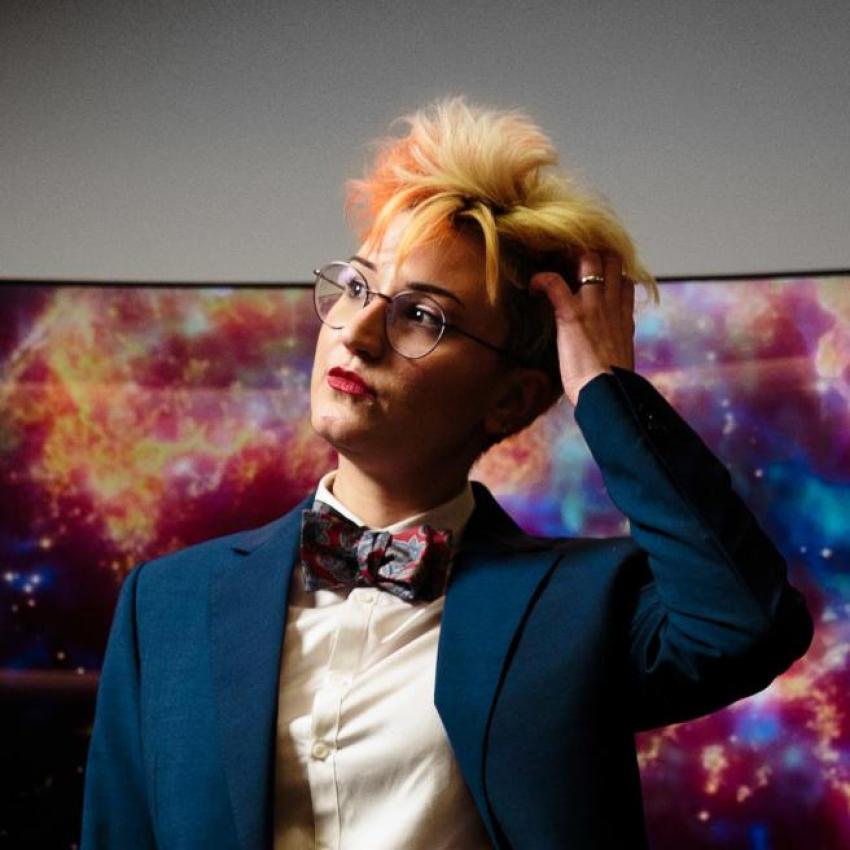An astrophysicist spearheading the creation of a virtual assistant to help find exploding stars and hungry black holes has been named as the winner of the 2024 Caroline Herschel Prize Lectureship.
Dr Heloise Stevance, of the University of Oxford, is a computational astronomer with a wide range of astrophysics and artificial intelligence (AI) expertise and an “impressive track record of first-author publications and invited talks”.
Her lecture topic will be: ‘How can AI help us find exploding stars and hungry black holes?’
Dr Stevance called it “an honour” to be awarded the lectureship “and for the recognition that the future of AI in science will rely on individuals being ‘fluent’ in two fields to see both opportunities and pitfalls”.
“The decisions we make now about our adoption of AI methods will affect future generations of astronomers,” she added.
“I feel privileged to be given a platform to speak about this topic, as well as some of my favourite stellar explosions and hungry-hungry black holes.”
Dr Stevance, who is also passionate about coding, gaming and has extensive experience of science communication, initially began working in observational astronomy with spectropolarimetry in her PhD.
She then became an expert in theoretical population synthesis at the University of Auckland and is now an independent fellow Schmidt AI in Science Fellow at Oxford, applying machine learning techniques to time domain astronomy.
This includes developing AI models - including a virtual research assistant - for international sky surveys that can detect thousands of supernovae and other stellar explosions every year.
Dr Stevance’s lecture will be particularly timely given that the Vera Rubin Observatory starts operations next year and demonstrates the application of AI to astrophysics, which is likely to be of interest to a wide audience.
When it comes online the state-of-the-art telescope in Chile is designed to capture an unprecedented amount of astronomical data in a 10-year survey called the LSST (Legacy Survey of Space and Time).
The Caroline Herschel Prize Lectureship was established in 2018 by what is now the Herschel Society, in association with the Royal Astronomical Society (RAS), to celebrate Caroline’s memory by supporting promising women astronomers early in their careers.
Caroline, William’s younger sister, started out as his assistant, but in time became recognised as an important astronomer in her own right, was the first to be paid as such, and was awarded the RAS Gold Medal in 1828.
Previous winners of the prize include Dr Marie Van de Sande, Dr Alexandra Amon, Dr Jennifer Carter and Dr Rebecca Smethurst.
The Caroline Herschel Prize Lecture 2024 will be hosted by the University of Bath in November in cooperation with the Herschel Society as part of the university’s public lecture series.
Charles Draper, chairman of the Herschel Society, said: “Caroline Herschel was an expert at manipulating astronomical information to make it more useful in her day.
“It is therefore entirely fitting that this year’s prize lectureship in her name should go to an early career woman astronomer investigating what AI can do to help our understanding of the universe."
Media contact
Sam Tonkin
Royal Astronomical Society
Mob: +44 (0)7802 877700
Notes for editors
About the Royal Astronomical Society
The Royal Astronomical Society (RAS), founded in 1820, encourages and promotes the study of astronomy, solar-system science, geophysics and closely related branches of science.
The RAS organises scientific meetings, publishes international research and review journals, recognises outstanding achievements by the award of medals and prizes, maintains an extensive library, supports education through grants and outreach activities and represents UK astronomy nationally and internationally. Its more than 4,000 members (Fellows), a third based overseas, include scientific researchers in universities, observatories and laboratories as well as historians of astronomy and others.
The RAS accepts papers for its journals based on the principle of peer review, in which fellow experts on the editorial boards accept the paper as worth considering. The Society issues press releases based on a similar principle, but the organisations and scientists concerned have overall responsibility for their content.


